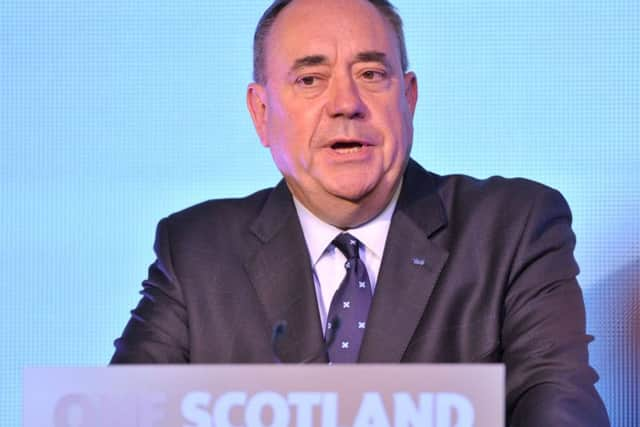Jo Swinson: Political fight over Salmond allegations may harm justice
No matter who you are and where you work, you should be able to go to your office, factory or shop-floor and know that you will be treated with respect and dignity. Sadly, when half of women, and one in five men, have been sexually harassed at work or in a place of study, that basic standard we all deserve is clearly not always met.
Many of those commenting on the Alex Salmond allegations seem to have forgotten that what is at stake here goes well beyond the shallow backbiting of partisan politics. At the heart of the story are two women who have raised distressing concerns about workplace harassment. It is their right and our duty to ensure that their claims are properly investigated. Irrespective of the outcome of the Court of Session case brought forward by Salmond or any criticism of the internal process, our priority right now should be for the police investigation to proceed with no obstacles.
Advertisement
Hide AdAdvertisement
Hide AdDisappointingly, some of those commenting on the issue have put party allegiance above human empathy. This shouldn’t be about nationalists versus unionists. But instead we see MSPs and MPs retweeting theories of a “British establishment” plot to bring down the Scottish Government because they are “terrified Scotland ends the 1707 Union”, or using the awful experience of these women to throw mud at the SNP leadership.


That kind of behaviour emboldens others to join in and bully complainants. The two women in Salmond’s case have been called “liars”, their allegations branded as “false” and “unsubstantiated”. It is hard enough for anyone to come forward in these situations. It is harder still if you are then subjected to judgements about your character and integrity by people who have no clue about the situation.
We should recognise that, though reporting harassment and abuse is difficult in any situation, there is an additional challenge when the perpetrator is a high-profile figure such as a politician. The complainant will understandably worry that the allegations become front-page news. Even with their anonymity protected, they must then endure their experience being pored over and pronounced upon by ill-informed commentators and keyboard warriors rushing to defend their political hero.
Inflammatory words and partisan statements turn the issue into a political football, which could discourage other women and men who have experienced sexual harassment from coming forward. Think before you tweet, as gender equality campaigner Talat Yaqoob rightly advised.
The media also has an important role to play. Too often these stories are reported using unhelpful language about the survivors and too often they reinforce common myths about sexual harassment. Sensationalising these reports detracts from the seriousness of what has happened and will again deter others from coming forward.
Zero Tolerance has produced a helpful guide for journalists on how to tell the whole story when reporting on violence against women, how to portray survivors and perpetrators accurately and how to be considerate about the feelings and vulnerabilities of those involved. Even something as simple as using the appropriate language to talk about the gravity of the assault can help – for example using words such as “sexual abuse” and “rape” instead of “affair” or “sex scandal”.
These incidents are not easy for any political party or institution to address. Given her long-standing relationship with Salmond and her position as leader of the SNP, Nicola Sturgeon has shown real grace in how she has dealt with the situation, rightly championing the importance of an independent complaints process.
Similar strength of character was shown by Leslie Evans, Permanent Secretary of the Scottish Government, in response to claims by the former First Minister, who is a powerful political figure, that the process was unfair. At times like these, strong leadership is so desperately needed and can boost confidence in the system – others will be watching what happens as they weigh up whether they feel safe to report sexual harassment.
Advertisement
Hide AdAdvertisement
Hide AdThere is no silver bullet to eradicating sexual harassment from any workplace, but there are actions that each of us can take to make sure that inappropriate behaviour is addressed and prevented in future.
To start with, sharing our own experience can be hugely powerful, if we have personally experienced harassment – that can either be through formal channels to make sure the issue isn’t ignored any longer or informally by talking to our friends and family so the problem is more visible to them.
It is also down to all of us to call out unacceptable behaviour, whether it’s ‘banter’ or unwanted advances, and offer our support to the person affected, including as a witness if they wish to report it.
We can also offer kind words and practical support to those who have decided to speak out. It takes a lot of courage to come forward, and no one should be afraid of being at the receiving end of abuse for doing so.
Finally, wherever you work, challenge your leaders if you feel your organisation’s policies are inadequate or if managers are not implementing them properly and fairly. The more of us that are willing to speak up and say that this kind of behaviour will not be tolerated, the harder it will be for those in power to ignore us.
Jo Swinson MP is deputy leader of the Liberal Democrats
